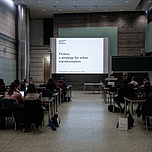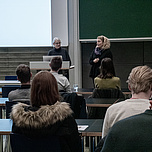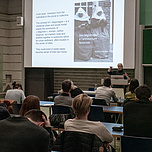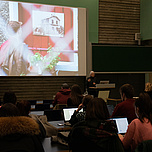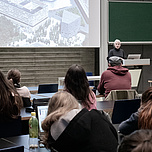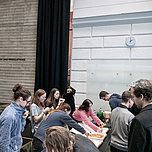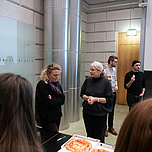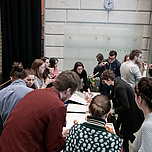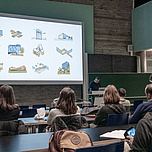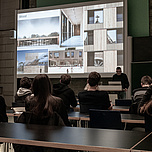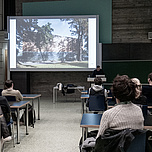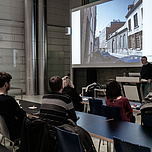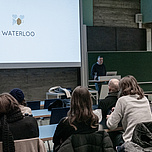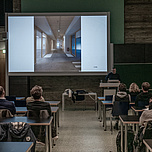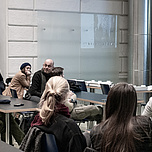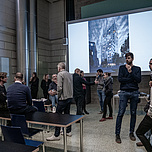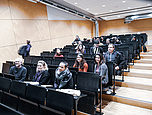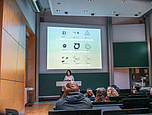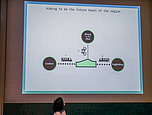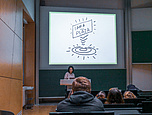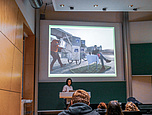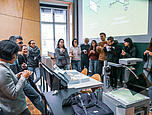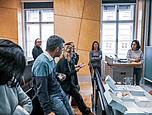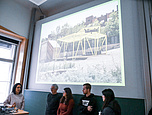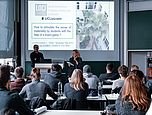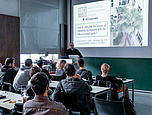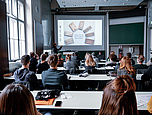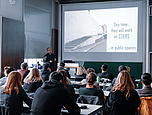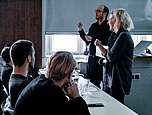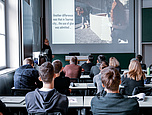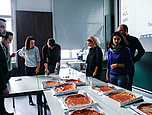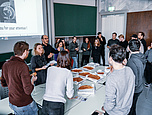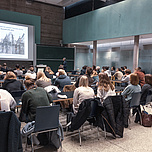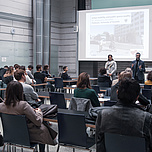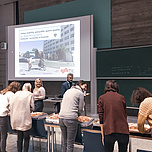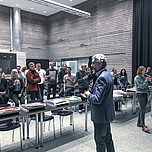Lunch Lectures
Lunch Lectures is an event series put on by the Institute of Urbanism, whereby throughout the semester various international guests from areas of planning, management and science are “invited to the table.”
At lunchtime, guests are invited to share their views on specific and current topics in the field of urbanism. Following the talk, the relaxed atmosphere of the Lunch Lectures encourages discussion. Over a shared meal, students and interested participants are able to enter into conversation with the lecturers and continue the discussion about trends and challenges in urban planning.
Dirk van Peijpe: "Watersquare Benthemplein Rotterdam"
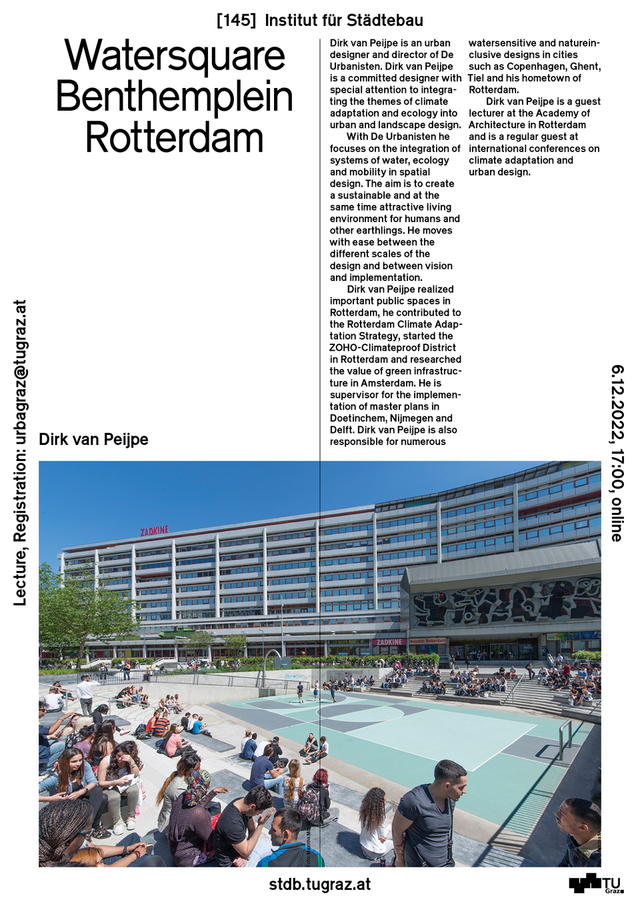
Lecture
Tuesday, December 6, 2022 | 5pm
online, register here
Dirk van Peijpe is an urban designer and director of De Urbanisten. Dirk van Peijpe is a committed designer with special attention to integrating the themes of climate adaptation and ecology into urban and landscape design. With de Urbanisten he focuses on the integration of systems of water, ecology and mobility in spatial design. The aim is to create a sustainble and at the same time attractive living environment for humans and other earthlings. He moves with ease between the different scales of the design and between vision and implementation. Dirk van Peijpe realized important public spaces in Rotterdam, he contributed to the Rotterdam Climate Adaption Strategy, started the ZOHO-Climateproof District in Rotterdam and researched the value of green infrastructure in Amsterdam. He is supervisor for the implementation of master plans in Doetinchem, Nijmegen and Delft. Dirk van Peijpe is also responsible for numerous watersensitive and natureinclusive designs in cities such as Copenhagen, Ghent, Tiel and his hometown of Rotterdam.
Dirk van Peijpe is a guest lecturer at the Academy of Architecture in Rotterdam and is a regular guest at international conferences on climate adaptation and urban design.
Julia Inclán: "Tandil, Argentina / Road Towards a Green City"
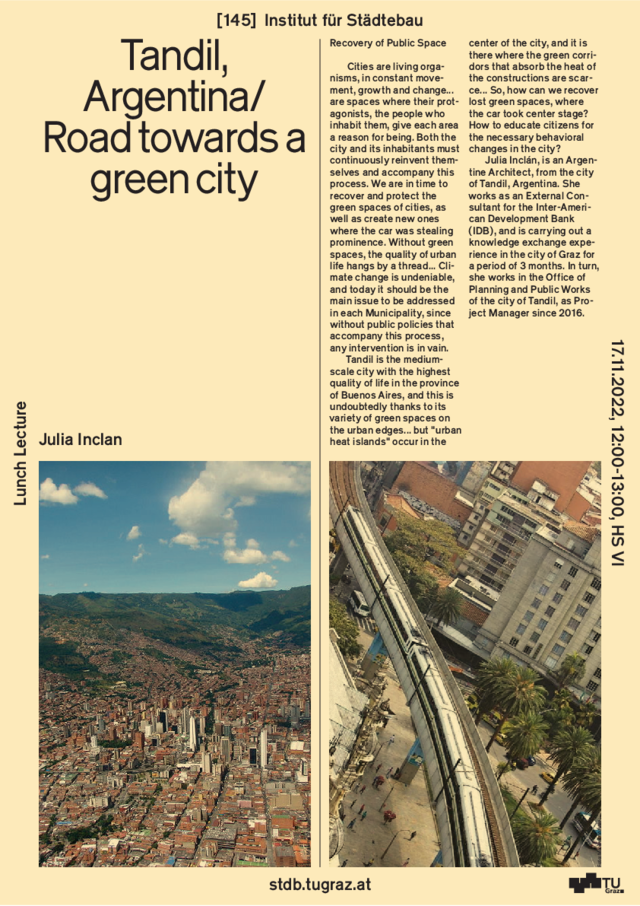
Lunch Lecture
Thursday, November 17, 2022 Donnerstag| 12 - 1pm
HS VI, Rechbauerstraße 12/EG, 8010 Graz
Recovery of Public Space
Cities are living organisms, in constant movement, growth and change... are spaces where their protagonists, the people who inhabit them, give each are a reason for being. Both the city and its inhabitants must continuously reinvent themselves and accompany this process. We are in time to recover and protect the green spaces of cities, as well as create new ones where the car was stealing prominence. Without green spaces, the quality of urban life hangs by a thread... Climate change is undeniable, and today it should be the main issue to be addressed in each Municipality, since without public policies that accompany this process, any intervention is in vain.
Tandil is the mediumscale city with the highest quality of life in the province of Buenos Aires, and this is undoubtedly thanks to its variety of green spaces on the urban edges... but "urban heat islands" occur in the center of the city, and it is there where the green corridors
that absorb the heat of the constructions are scarce... So, how can we recover lost green spaces, where the car took center stage? How to educate citizens for the necessary behavioral changes in the city?
Julia Inclán is an Argentine Architect, from the city of Tandil, Argentina. She works as an External Consultant for the Inter-American Development Bank (IDB), and is carrying out a knowledge exchange experience in the city of Graz for a period of 3 months. In turn, she works in the Office of Planning and Public Works of the city of Tandil, as Project Manager since 2016.
Andrea Teschinegg: "Herausforderung Raumordnung"
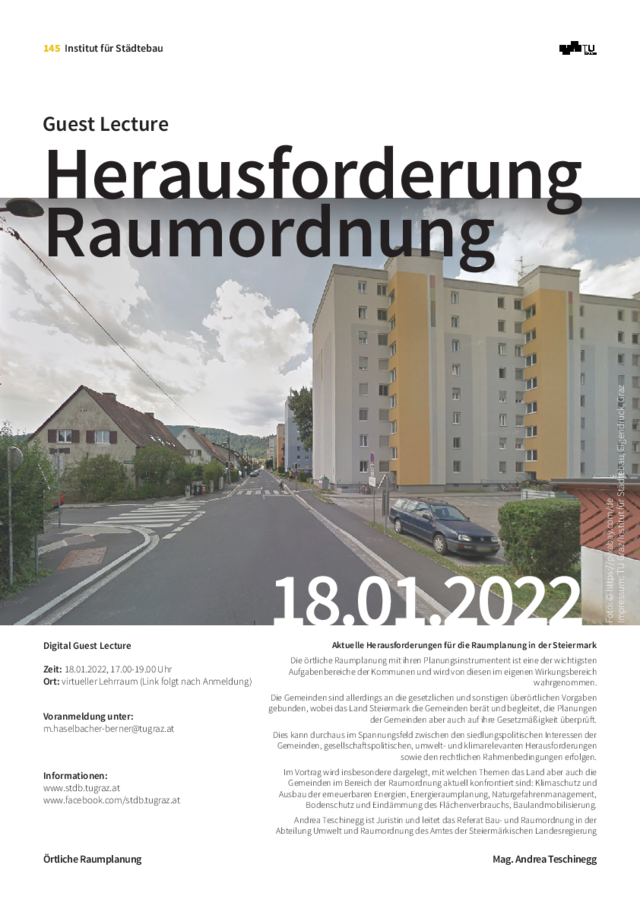
Digital Guest Lecture
Tuesday, January 18, 2022 | 5 - 7pm
Webex (Link folgt nach Anmeldung)
Voranmeldung unter: m.haselbacher-berner@tugraz.at
Die örtliche Raumplanung mit ihren Planungsinstrumentent ist eine der wichtigsten Aufgabenbereiche der Kommunen und wird von diesen im eigenen Wirkungsbereich wahrgenommen.
Die Gemeinden sind allerdings an die gesetzlichen und sonstigen über örtlichen Vorgaben gebunden, wobei das Land Steiermark die Gemeinden berät und begleitet, die Planungen der Gemeinden aber auch auf ihre Gesetzmäßigkeit überprüft. Dies kann durchaus im Spannungsfeld zwischen den siedlungspolitischen Interessen der Gemeinden, gesellschaftspolitischen, umwelt- und klimarelevanten Herausforderungen sowie den rechtlichen Rahmenbedingungen erfolgen.
Im Vortrag wird insbesondere dargelegt, mit welchen Themen das Land aber auch die Gemeinden im Bereich der Raumordnung aktuell konfrontiert sind: Klimaschutz und Ausbau der erneuerbaren Energien, Energieraumplanung, Naturgefahrenmanagement, Bodenschutz und Eindämmung des Flächenverbrauchs, Baulandmobilisierung.
Matthias Armengaud: "Fallowscapes. Territorial Reconfiguration Strategies"
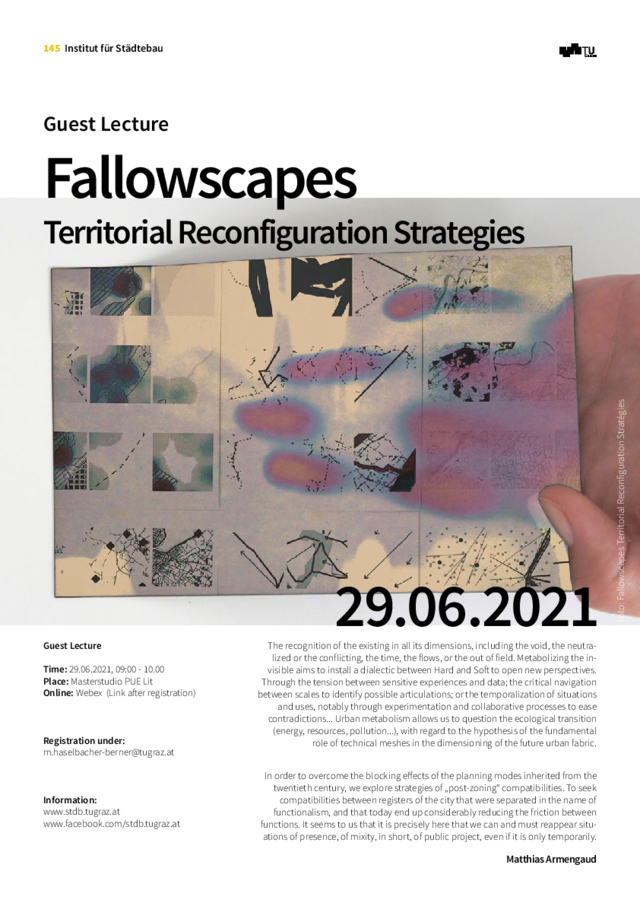
Guest Lecture
Tuesday, June, 29 2021 | 9 - 10am
Location: Masterstudio PUE Lit;
Webex
Registration: m.haselbacher-berner@tugraz.at
The recognition of the existing in all its dimensions, including the void, the neutralized or the conflicting, the time, the flows, or the out of field. Metabolizing the in-visible aims to install a dialectic between Hard and Soft to open new perspectives. Through the tension between sensitive experiences and data; the critical navigation between scales to identify possible articulations; or the temporalization of situations and uses, notably through experimentation and collaborative processes to ease contradictions... Urban metabolism allows us to question the ecological transition (energy, resources, pollution...), with regard to the hypothesis of the fundamental role of technical meshes in the dimensioning of the future urban fabric.
In order to overcome the blocking effects of the planning modes inherited from the twentieth century, we explore strategies of „post-zoning“ compatibilities. To seek compatibilities between registers of the city that were separated in the name of functionalism, and that today end up considerably reducing the friction between functions. It seems to us that it is precisely here that we can and must reappear situ-ations of presence, of mixity, in short, of public project, even if it is only temporarily.
Wouter van der Veur: "Growing Pains. The Challenges of Spatial Planning in Amsterdam"
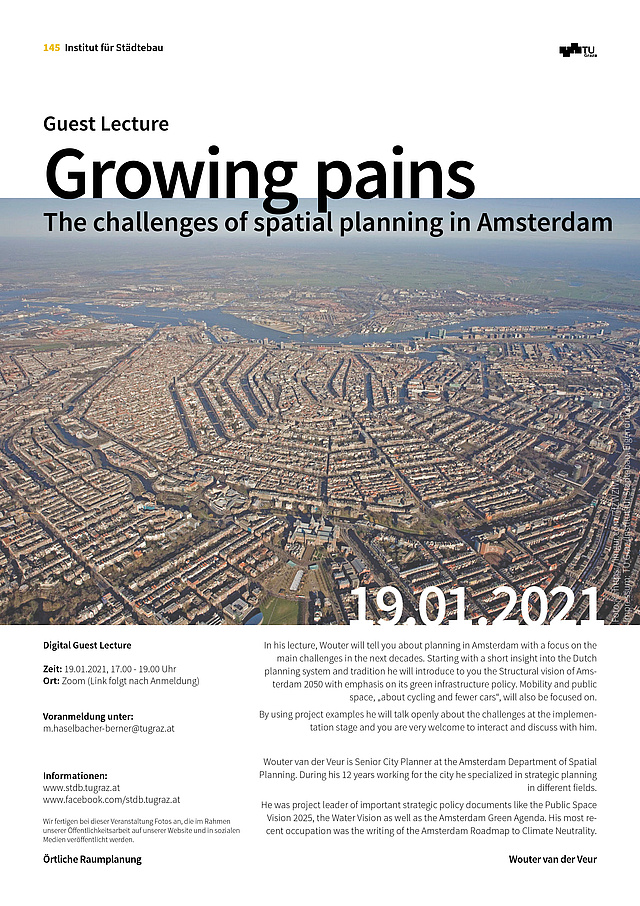
Digital Guest Lecture
January, 19 2021 | 5 - 7pm
Zoom
Registration: m.haselbacher-berner@tugraz.at
In his lecture, Wouter will tell you about planning in Amsterdam with a focus on the main challenges in the next decades. Starting with a short insight into the Dutch planning system and tradition he will introduce to you the Structural vision of Amsterdam 2050 with emphasis on its green infrastructure policy. Mobility and public space, „about cycling and fewer cars“, will also be focused on.
By using project examples he will talk openly about the challenges at the implementation stage and you are very welcome to interact and discuss with him.
Wouter van der Veur is Senior City Planner at the Amsterdam Department of Spatial Planning. During his 12 years working for the city he specialized in strategic planning in different fields.
He was project leader of important strategic policy documents like the Public Space Vision 2025, the Water Vision as well as the Amsterdam Green Agenda. His most re- cent occupation was the writing of the Amsterdam Roadmap to Climate Neutrality.
SML: "Magna in the 60's"
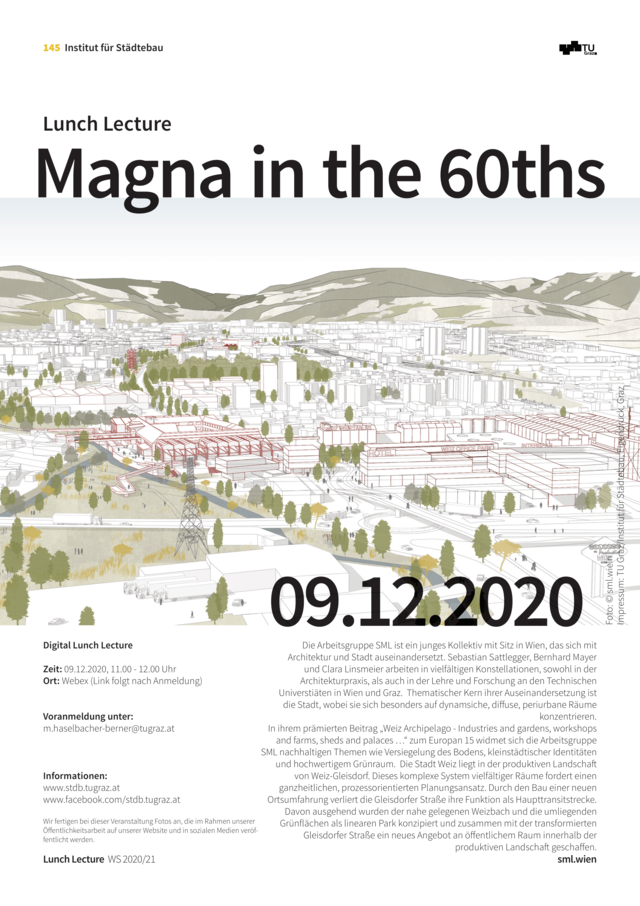
Digital Lunch Lecture
Wednesday, December 9, 2020 | 11 - 12am
Ort: WebEx (Link folgt nach Anmeldung)
Voranmeldung unter: m.haselbacher-berner@tugraz.at
Die Arbeitsgruppe SML ist ein junges Kollektiv mit Sitz in Wien, das sich mit Architektur und Stadt auseinandersetzt. Sebastian Sattlegger, Bernhard Mayer und Clara Linsmeier arbeiten in vielfältigen Konstellationen, sowohl in der Architekturpraxis, als auch in der Lehre und Forschung an den Technischen Universtiäten in Wien und Graz. Thematischer Kern ihrer Auseinandersetzung ist die Stadt, wobei sie sich besonders auf dynamsiche, diffuse, periurbane Räume konzentrieren. In ihrem prämierten Beitrag „Weiz Archipelago - Industries and gardens, workshops and farms, sheds and palaces ...“ zum Europan 15 widmet sich die Arbeitsgruppe SML nachhaltigen Themen wie Versiegelung des Bodens, kleinstädtischer Identitäten und hochwertigem Grünraum. Die Stadt Weiz liegt in der produktiven Landschaft von Weiz-Gleisdorf. Dieses komplexe System vielfältiger Räume fordert einen ganzheitlichen, prozessorientierten Planungsansatz. Durch den Bau einer neuen Ortsumfahrung verliert die Gleisdorfer Straße ihre Funktion als Haupttransitstrecke. Davon ausgehend wurden der nahe gelegenen Weizbach und die umliegenden Grünflächen als linearen Park konzipiert und zusammen mit der transformierten Gleisdorfer Straße ein neues Angebot an öffentlichem Raum innerhalb der produktiven Landschaft geschaffen.
Michiel van Balen: "Placemaking. The City Should Be Rebuilt for Its Users!"
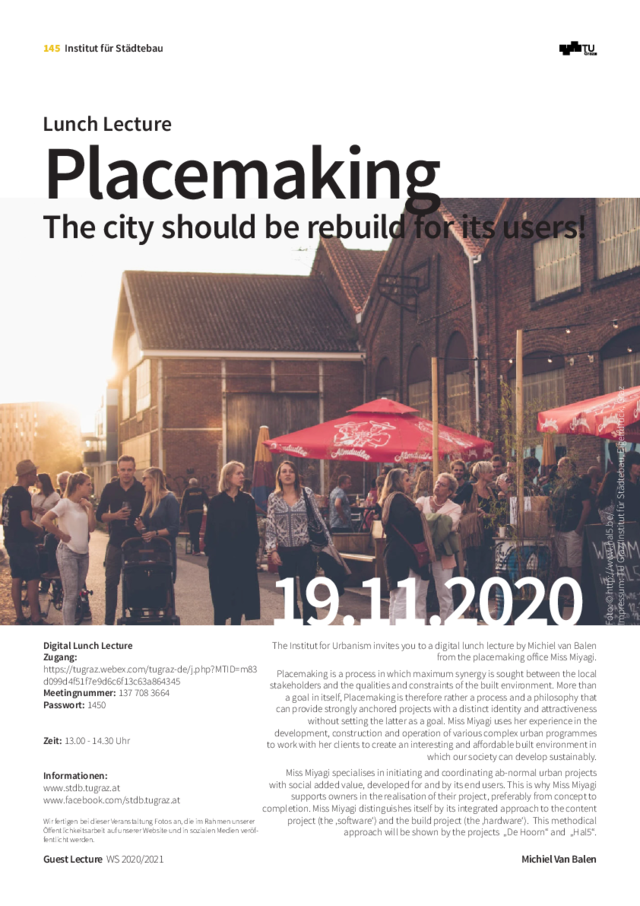
Digital Lunch Lecture
Thursday, November 19, 2020 | 1 - 2:30pm
Zugang: tugraz.webex.com/tugraz-de/j.php d099d4f51f7e9d6c6f13c63a864345
Meetingnummer: 137 708 3664
Password: 1450
Placemaking is a process in which maximum synergy is sought between the local stakeholders and the qualities and constraints of the built environment. More than a goal in itself, Placemaking is therefore rather a process and a philosophy that can provide strongly anchored projects with a distinct identity and attractiveness without setting the latter as a goal. Miss Miyagi uses her experience in the development, construction and operation of various complex urban programmes to work with her clients to create an interesting and affordable built environment in which our society can develop sustainably.
Miss Miyagi specialises in initiating and coordinating ab-normal urban projects with social added value, developed for and by its end users. This is why Miss Miyagi supports owners in the realisation of their project, preferably from concept to completion. Miss Miyagi distinguishes itself by its integrated approach to the content project (the ‚software‘) and the build project (the ‚hardware‘). This methodical approach will be shown by the projects „De Hoorn“ and „Hal5“.
Anna Maria Bagarić: "Stadt - Raum - Architektur"
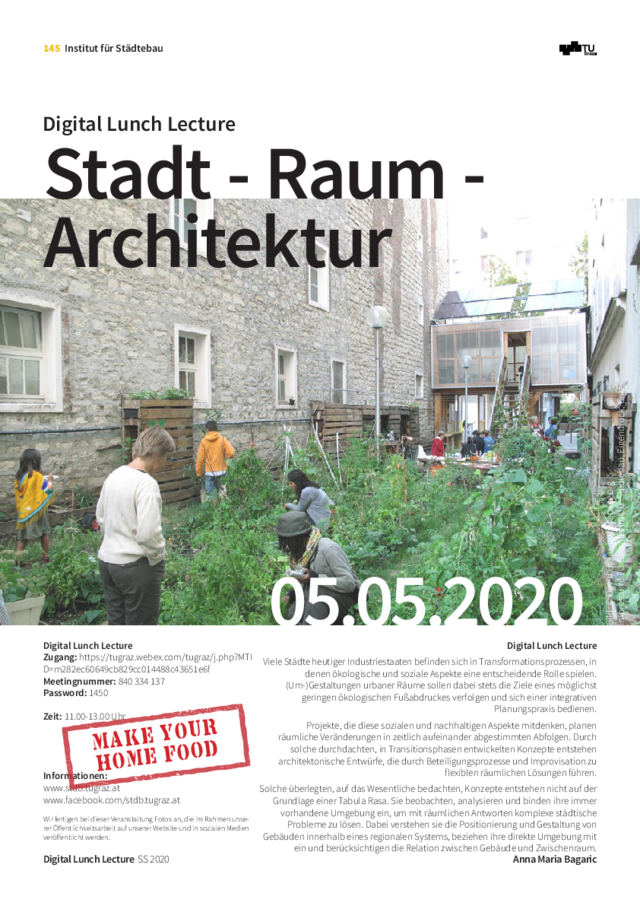
Digital Lunch Lecture
Tuesday, May 05, 2020 | 11am - 1pm
Access: tugraz.webex.com/tugraz/j.php
Meetingno: 840 334 137
Password: 1450
Viele Städte heutiger Industriestaaten befinden sich in Transformationsprozessen, in denen ökologische und soziale Aspekte eine entscheidende Rolle spielen. (Um-)Gestaltungen urbaner Räume sollen dabei stets die Ziele eines möglichst geringen ökologischen Fußabdruckes verfolgen und sich einer integrativen Planungspraxis bedienen.
Projekte, die diese sozialen und nachhaltigen Aspekte mitdenken, planen räumliche Veränderungen in zeitlich aufeinander abgestimmten Abfolgen. Durch solche durchdachten, in Transitionsphasen entwickelten Konzepte entstehen architektonische Entwürfe, die durch Beteiligungsprozesse und Improvisation zu flexiblen räumlichen Lösungen führen.
Solche überlegten, auf das Wesentliche bedachten, Konzepte entstehen nicht auf der Grundlage einer Tabula Rasa. Sie beobachten, analysieren und binden ihre immer vorhandene Umgebung ein, um mit räumlichen Antworten komplexe städtische Probleme zu lösen. Dabei verstehen sie die Positionierung und Gestaltung von Gebäuden innerhalb eines regionalen Systems, beziehen ihre direkte Umgebung mit
ein und berücksichtigen die Relation zwischen Gebäude und Zwischenraum.
Carole Schmit: "Fiction for Urban Transformation"
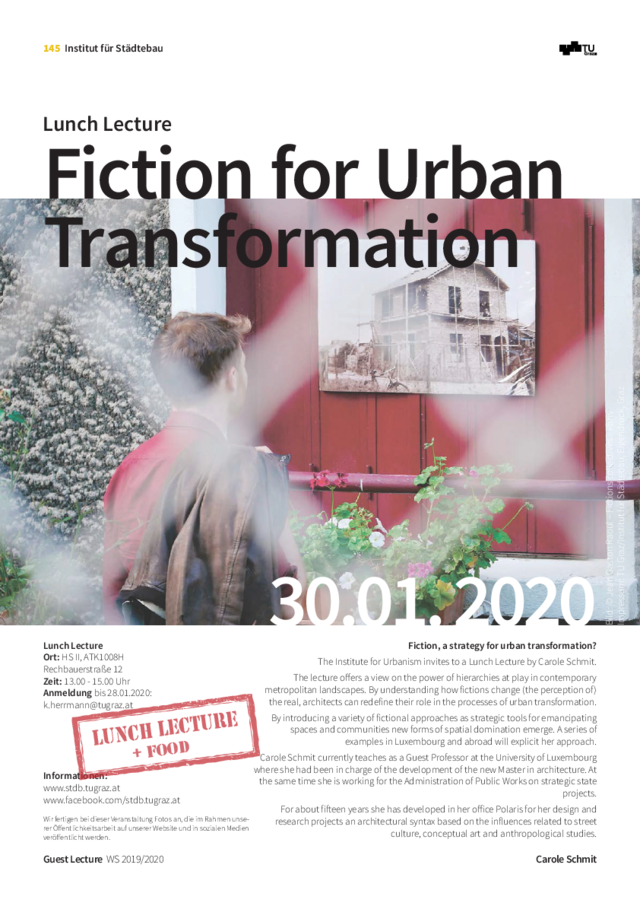
Lunch Lecture
Thursday, January 30, 2020 | 1pm - 3pm
HS II | Rechbauerstraße 12 | 8010 Graz
Registration until Tuesday, January 28, 2020 to k.herrmann@tugraz.at
The Institute of Urbanism invites to a Lunch Lecture by Carole Schmit. The lecture offers a view on the power of hierarchies at play in contemporary metropolitan landscapes. By understanding how fictions change (the perpection of) the real, architects can redefine their role in the processes of urban transformation. By introducing a variety of fictional approaches as strategic tools for emancipating spaces and communities new forms of spatial domination emerge. A series of examples in Luxembourg and abroad will explicit her approach.
Carole Schmit currently teaches as a Guest Professor at the University of Luxembourg where she had been in charge of the development of the new Master in architecture. At the same time she is working for the Administration of Public Works on strategic state projects. For about fifteen years she has developed in her office Polaris for her design and research projects an architectural syntax based on the influences related to street culture, conceptual art and anthropological studies.
Grégoire Houyet: "Education. Buildings in Wood"
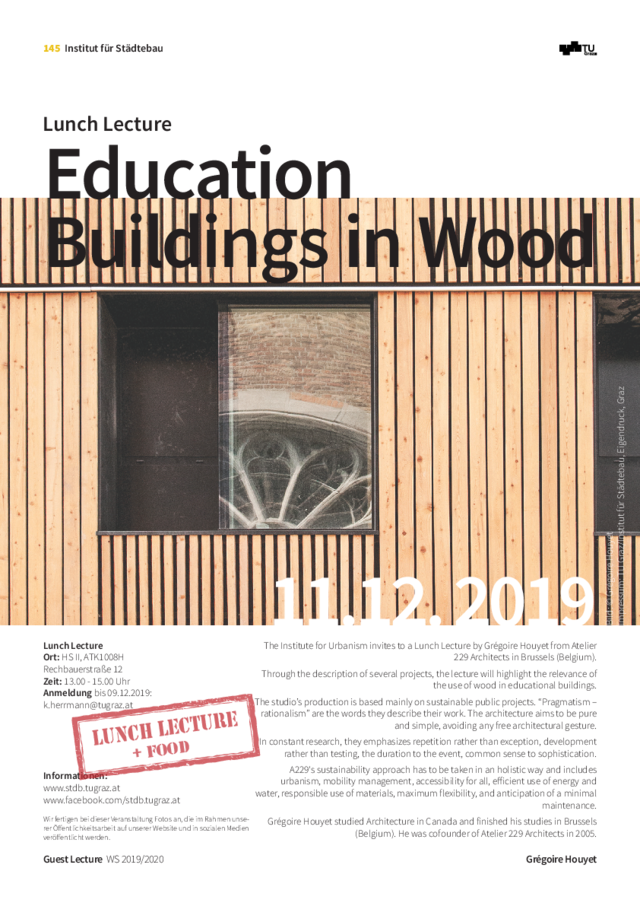
Lunch Lecture
Wednesday, December 11, 2019 | 1pm - 3pm
HS II | Rechbauerstraße 12 | 8010 Graz
Registration until Monday, December 9, 2019 to k.herrmann@tugraz.at
The Institute of Urbanism is hosting a Lunch Lecture by Grégoire Houyet from Atelier 229 Architects in Brussels (Belgium). Through the description of several projects, the lecture will highlight the relevance of the use of wood in educational buildings. The studio’s production is based mainly on sustainable public projects. “Pragmatism – rationalism” are the words they use to describe their work. Their architecture aims to be pure and simple, avoiding any free architectural gestures. Through constant research, they emphasize repetition rather than exception, development rather than testing, duration over event, and common sense over sophistication. A229‘s approach to sustainability should be understood in an holistic way and includes urbanism, mobility management, accessibility for all, efficient use of energy and water, responsible use of materials, maximum flexibility, and anticipation of a minimal maintenance.
Grégoire Houyet studied Architecture in Canada and finished his studies in Brussels (Belgium). He was cofounder of Atelier 229 Architects in 2005.
Katerina Psegiannaki: "Exploring Togetherness"
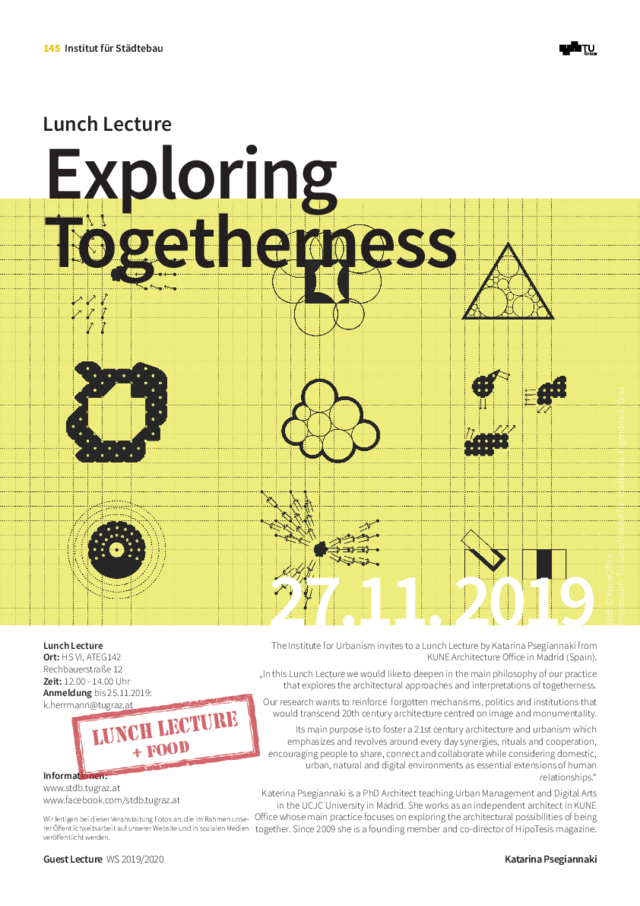
Lunch Lecture
Wednesday, November 27, 2019 | 12am - 2pm
HS V, Rechbauerstraße 12, 8010 Graz
Registration until Monday, November 25, 2019 at k.herrmann@tugraz.at
The Institute of Urbanism is pleased to announce a Lunch Lecture by Katerina Psegiannaki from KUNE Architecture Office in Madrid (Spain).
In this Lunch Lecture, we would like to go deeper into the main philosophy of our practice, through which we explore the architectural approaches and interpretations of togetherness. Our research seeks to reinforce forgotten mechanisms, politics and institutions that would transcend 20th century architecture, and that are centered on image and monumentality. Its main purpose is to foster a 21st century architecture and urbanism which emphasizes and revolves around every day synergies, rituals and cooperation, encouraging people to share, connect and collaborate while considering domestic, urban, natural and digital environments as essential extensions of human relationships.
Katerina Psegiannaki is a PhD Architect teaching Urban Management and Digital Arts in the UCJC University in Madrid. She works as an independent architect in KUNE Office whose main practice focuses on exploring the architectural possibilities of being together. Since 2009 she is a founding member and co-director of HipoTesis magazine.
François Vermer: "Sense of Materiality"
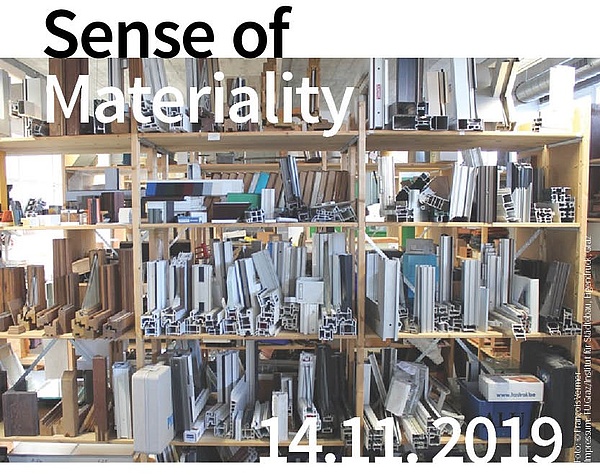
Lunch Lecture
Thursday, November 14, 2019 | 11.30am - 1.30pm
HS V, Rechbauerstraße 12, 8010 Graz
Registrations until Monday, November 12, 2019 at k.herrmann@tugraz.at
How to stimulate the sense of materiality by students with the help of a board game about architecture and the construction?
The Institute for Urbanism invites to a Lunch Lecture by François Vermer. On one hand his lecture will focus on the «material library» organized by him, which is a place for students attending this faculty to have a direct «skincontact». They can feel, touch and weigh the materials used for outdoor design, buildings as well as the main constructive systems of them.
On the other hand he will explain the «board game» they have developed to help young people and students to experience the everyday reality of young working architects. This role play is an opportunity to learn about the fascinating world of urban design, architecture and renovation.
Since 2008 François Vermer is been teaching in ISA-Saint-Luc (Brussels, Belgium) in two different topics: Topography and Earth Sciences (geology and the use of rocks in architecture mostly). He coordinates together with his colleague J. Malevez the «material library» of the Faculty of Architecture, Architectural Engineering and Urban Planning (LOCI, UCL).
Alejandro L. Grindlay: "Urban Mobility and Public Spaces Quality"
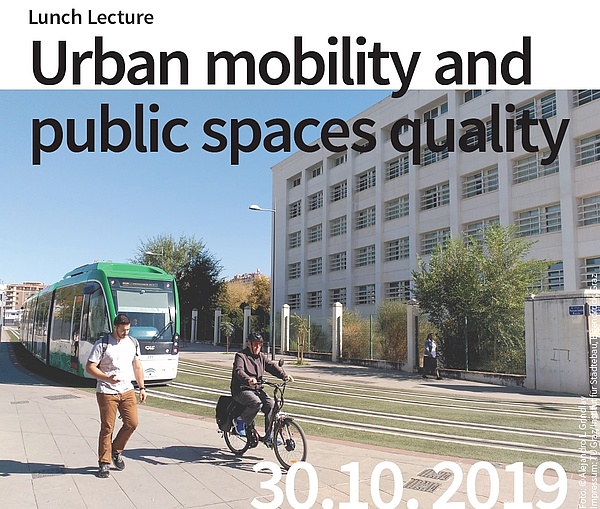
Lunch Lecture
Wednesday, October 30, 2019 | 12am - 2pm
HS II, Rechbauerstraße 12, 8010 Graz
Registration until Monday, November 25, 2019 at k.herrmann@tugraz.at
The Institute of Urbanism is pleased to host a Lunch Lecture by Alejandro L. Grindlay.
Alejandro L. Grindlay´s lecture will focus on the relation between urban mobility and public spaces. Urban mobility has a strong influence on the quality of urban public spaces. A higher quality of urban public transport systems implies a higher quality of urban public space. Significant investments in public transport systems are generally associated with urban renewal. The limitation of private motorized transport provides more space for pedestrians and better environmental quality; however, the number of motorized vehicles is still growing, and new electric vehicles won’t solve the problems linked to limited urban space. There are numerous examples worldwide that reveal the urban changes produced by the promotion of more sustainable modes of mobility. Many Spanish cities, such as Granada, contain places that are linked to different forms of mobility and that exemplify those facts.
Alejandro L. Grindlay lectures and conducts research at the University of Granada (Spain), where he also completed his Master degree in Urban Planning and Management in 2005.
Michael Ryckewaert: "Univer[X]ity"
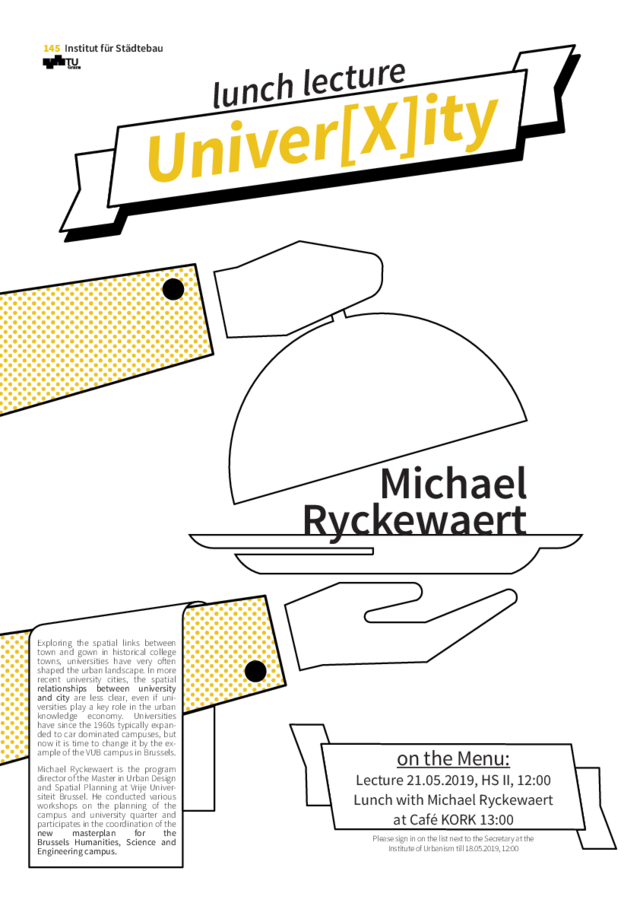
Lunch Lecture
Monday, May 21, 2019 | 12am - 1pm
HS II, Rechbauerstraße 12, 8010 Graz
Lunch: 1pm, Cafè KORK
On exploring the spatial links between town and gown in historical college towns: universities have very often shaped the urban landscape. In more recent university cities, the spatial relationships between university and city are less clear, even if universities play a key role in the urban knowledge economy. Since the 1960s universities have typically expanded to become car-dominated campuses, but now it is time to change this trend in looking at the example of the VUB campus in Brussels.
Michael Ryckewaert is the program director of the Master in Urban Design and Spatial Planning at Vrije Universiteit Brussel. He has conducted various workshops on the planning of the campus and university quarter, and participates in the coordination of the new masterplan for the Brussels Humanities, Science and Engineering campus.
Blaž Babnik Romaniuk: "Trying Not to Fail Too Often"
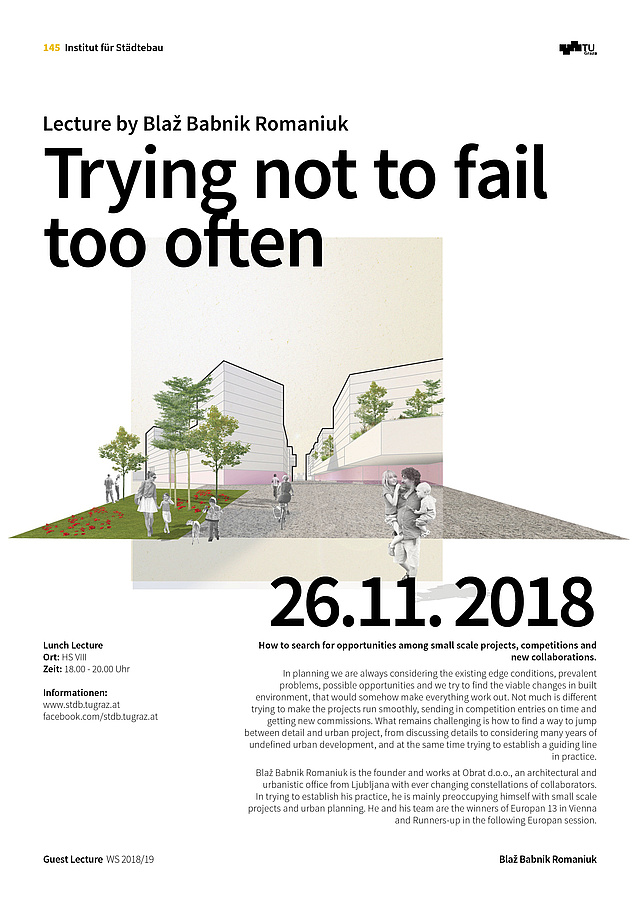
Guest Lecture
Monday, November 26, 2018 | 6 - 8pm
HS VIII, Rechbauerstraße 12/2.OG, 8010 Graz
How to search for opportunities among small scale projects, competitions and new collaborations
In planning we are always considering the existing edge conditions, prevalent problems, possible opportunities and we try to find the viable changes in built environment, that would somehow make everything work out. Not much is different trying to make the projects run smoothly, sending in competition entries on time and getting new commissions. What remains challenging is how to find a way to jump between detail and urban project, from discussing details to considering many years of undefined urban development, and at the same time trying to establish a guiding line in practice.
Blaž Babnik Romaniuk is the founder and works at Obrat d.o.o., an architectural and urbanistic office from Ljubljana with ever changing constellations of collaborators. In trying to establish his practice, he is mainly preoccupying himself with small scale projects and urban planning. He and his team are the winners of Europan 13 in Vienna and Runners-up in the following Europan session.
Lina Streeruwitz: "Lässige Typen, laute Schollen, rosa Zonen"
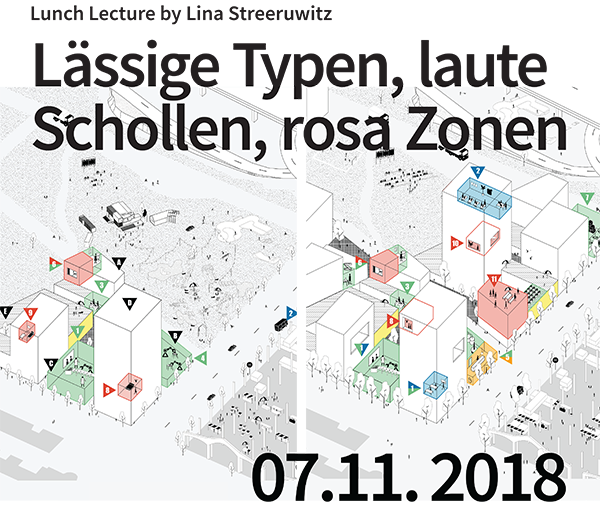
Lunch Lecture
Wednesday, November 7, 2018 | 12am - 1pm
HS XII, Rechbauerstraße 12, 8010 Graz
Mixing Ratios for the Productive City
Even though the credo of the "productive city" has been widely proclaimed in recent years, we are still confronted with a key question in the everyday business of urban planning: What else is there, beyond living? How can forces of mixing be mobilized, if no one is asking for it? If urban development is primarily driven by an overheated housing market, how can we continue to think about spaces of working and producing? How can work be protected from the ubiquitously "advancing housing"; how and where can it find space in the house, in the neighborhood and in the city?
StudioVlayStreeruwitz has been working since 2009 at the interface of architecture, urbanism and research. The main focal points of the studio’s work are, on the one hand, the development of urban planning strategies for large-scale developments (such as the North Railway Station in Vienna) and, on the other hand, the planning of innovative housing concepts in the subsidized and privately financed sector. The question of the urban potential of the housing program ("living plus") plays a key role here. Increasingly, however, the "other" of living – work and production - is in the foreground, perhaps precisely because in current urban planning practices it is often most evident in its absence. StudioVlayStreeruwitz is co-author of the FFG Smart City research project "Mixture: Possible!" and the follow-up project "Mixture: North Station," as well as the concept of "Productive City" for the City of Vienna.
Julia Inclán, November 17, 2022
Andrea Teschinegg, January 18, 2022
Matthias Armengaud, June 29, 2021
Wouter van der Veur, January 19, 2021
SML, December 9, 2020
Michiel van Balen, November 19, 2020
Anna Maria Bagarić, May 5, 2020
Carole Schmit, January 30, 2020
Grégoire Houyet, December 11, 2019
Katerina Psegiannaki, November 27, 2019
François Vermer, November 14, 2019
Alejandro L. Grindlay, October 30, 2019
Michael Ryckewaert, May 21, 2019
Blaž Babnik Romaniuk, November 26, 2018
Lina Streeruwitz, November 7, 2018

